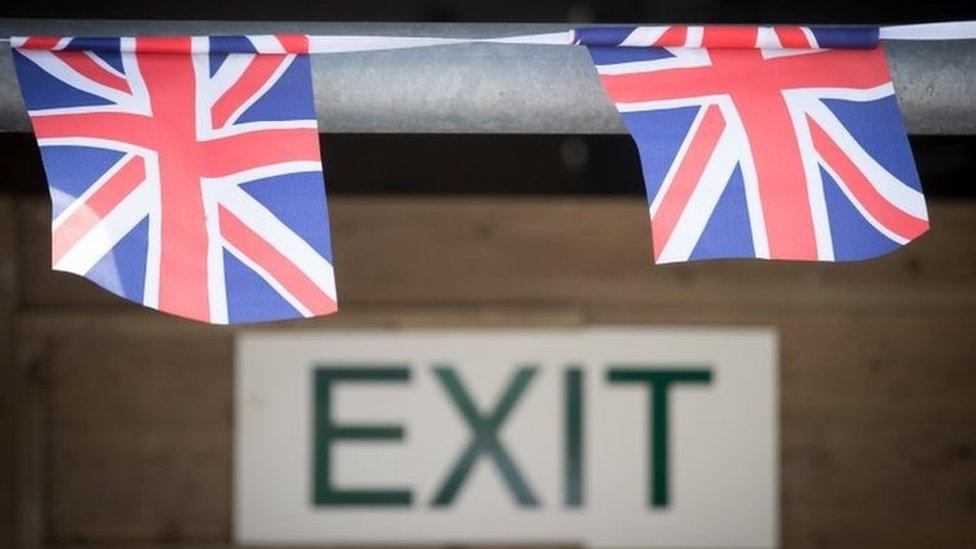Brexit: Don't underestimate Boris Johnson, EU warned
- Published
- comments

The prime minister's chief Brexit negotiator has urged his EU counterparts not to "underestimate" Boris Johnson.
David Frost - Mr Johnson's so-called EU "sherpa" - told his colleagues "many people are inclined" to do just that, but it would be a mistake.
"You should be in no doubt about this government's commitment to the 31 October date," he added in an email.
It emerged as the cabinet ramps up preparations for a no-deal Brexit.
Two new committees have been created - the Exit Strategy committee, known as XS, to make key Brexit decisions, and the Daily Operations Committee, to deal with the nitty gritty of no-deal planning.
The former will gather twice a week and be attended by six senior ministers including the PM, Chancellor Sajid Javid, Foreign Secretary Dominic Raab and Chancellor of the Duchy of Lancaster Michael Gove.
Mr Gove - who is in charge of preparations for a potential no deal - will oversee Monday's meeting because Mr Johnson is on a visit to Scotland.
Mr Gove told reporters earlier: "There won't be any delays, we are determined that we are going to leave on October 31st, and it's my job to make sure the country is ready."
When asked if he stood by his previous comment that the chances of a no-deal Brexit were a "million to one", the prime minister said: "Provided there is sufficient goodwill and common sense on the part of our partners, that is exactly where I would put the odds."
The BBC's assistant political editor Norman Smith says meetings of the Daily Operations Committee will be held in the Cobra emergency committee room, normally set aside for large-scale crises like terror attacks - a decision designed to symbolically underline that the country is now engaged on a national mission to get ready.
'Turbo-charging'
The Confederation of British Industry, meanwhile, is warning that neither the UK nor the EU is ready for a no-deal Brexit.
It has published practical steps it says countries and firms can take, but says "the unprecedented nature of Brexit means some aspects cannot be mitigated".
Mr Raab told the BBC earlier "a load of preparation has already been done" for the event of no deal, but the government was now "turbo-charging" those efforts and "reaching out to sectors that may feel vulnerable".
"The most important thing is to provide assurance about the risk in balanced way, but the biggest risk is to allow the uncertainty of the tortuous process we have been in with the EU to continue.
"The one reassurance we can give to businesses worried about uncertainty - is that we are going to provide some finality by coming out at the end of October."
The prime minister's official spokesman said Mr Johnson had spoken to a number of leaders since coming to office last Wednesday, but not yet Irish Taoiseach Leo Varadkar.
He said the prime minister had been clear he wanted to meet them and negotiate, but not to sit down and be told that the EU cannot possibly re-open the withdrawal agreement.


David Frost is an important member of the new government's Brexit team. He might not be a household name but neither was his predecessor, Olly Robbins, when he started and look where he ended up.
"Frosty" - as he's known to some colleagues - may become the person who speaks to the EU the most - whether it's to his counterparts in other prime ministers' offices, or the European Union negotiating team in Brussels.
His email to his opposite numbers reflects the concerns of British diplomats, who fear the EU has not grasped just how much the UK position has changed since the Theresa May era.
He signed off his message with the French for "hopefully see you soon", but it's not clear when the two sides will start talking again… whether at official, ministerial or prime ministerial level.

In his letter to fellow sherpas - written last week but seen now by the BBC - Mr Frost urged them to take note of the prime minister's first statement to MPs after entering Number 10 in which he restated his commitment to leaving the EU on 31 October with or without a deal.
"I would also add that many people are inclined to underestimate Boris Johnson and I would urge you not to do so," he wrote.
He also paid tribute to his predecessor Olly Robbins, writing that he "deserved better" than the personal criticism he had received for doing his job.
Mr Frost is no stranger to the European political scene, having spent more than 20 years at the Foreign Office, including serving as the British ambassador to Denmark from 2006 to 2008.
He was part of the team of advisers around Foreign Secretary Boris Johnson, until his boss resigned in 2018, and has spent the last six months running the London Chamber of Commerce and Industry.
'Minimise the impact'
Over the weekend, Mr Gove said the government was now "working on the assumption" of a no-deal Brexit.
That contrasts with what Mr Johnson said during the Conservative leadership campaign, when he claimed the chances of one happening were "a million to one".
On Monday, one of the MPs most committed to preventing a no deal said he had accepted it might not be possible to block it.
Former Conservative minister Sir Oliver Letwin told BBC Radio 4's Today programme: "We have to accept this government intends, if it can't get a deal that it likes, to take us out without a deal so we may find ourselves leaving without a deal, and in that context is makes abundant sense to do everything that can be done in the next three month to prepare the country minimise the impact of it."